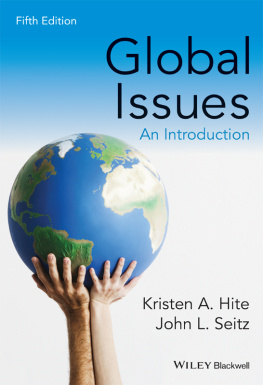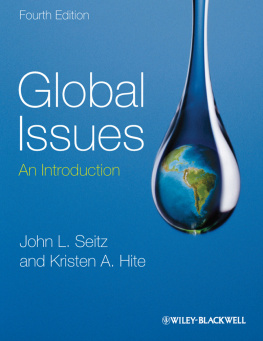Hite Kristen A. - Global Issues: An Introduction
Here you can read online Hite Kristen A. - Global Issues: An Introduction full text of the book (entire story) in english for free. Download pdf and epub, get meaning, cover and reviews about this ebook. year: 2016, publisher: John Wiley & Sons, genre: Politics. Description of the work, (preface) as well as reviews are available. Best literature library LitArk.com created for fans of good reading and offers a wide selection of genres:
Romance novel
Science fiction
Adventure
Detective
Science
History
Home and family
Prose
Art
Politics
Computer
Non-fiction
Religion
Business
Children
Humor
Choose a favorite category and find really read worthwhile books. Enjoy immersion in the world of imagination, feel the emotions of the characters or learn something new for yourself, make an fascinating discovery.
- Book:Global Issues: An Introduction
- Author:
- Publisher:John Wiley & Sons
- Genre:
- Year:2016
- Rating:4 / 5
- Favourites:Add to favourites
- Your mark:
- 80
- 1
- 2
- 3
- 4
- 5
Global Issues: An Introduction: summary, description and annotation
We offer to read an annotation, description, summary or preface (depends on what the author of the book "Global Issues: An Introduction" wrote himself). If you haven't found the necessary information about the book — write in the comments, we will try to find it.
Global Issues: An Introduction — read online for free the complete book (whole text) full work
Below is the text of the book, divided by pages. System saving the place of the last page read, allows you to conveniently read the book "Global Issues: An Introduction" online for free, without having to search again every time where you left off. Put a bookmark, and you can go to the page where you finished reading at any time.
Font size:
Interval:
Bookmark:

New to this edition, please find a Facebook page for Global Issues, which features updates on many of the subjects discussed in this book. Please feel welcome to visit, like, comment, and share:
https://www.facebook.com/GlobalIssuesHiteSeitz
An Introduction
Kristen A. Hite and John L. Seitz

This fifth edition first published 2016
2016 John Wiley & Sons Ltd
Edition History: Blackwell Publishers Ltd (1e, 1995); Blackwell Publishing Ltd (2e, 2002 and 3e, 2008); John Wiley & Sons Ltd (4e, 2012)
Registered Office
John Wiley & Sons Ltd, The Atrium, Southern Gate, Chichester, West Sussex, PO19 8SQ, UK
Editorial Offices
350 Main Street, Malden, MA 02148-5020, USA
9600 Garsington Road, Oxford, OX4 2DQ, UK
The Atrium, Southern Gate, Chichester, West Sussex, PO19 8SQ, UK
For details of our global editorial offices, for customer services, and for information about how to apply for permission to reuse the copyright material in this book please see our website at www.wiley.com/wiley-blackwell.
The right of Kristen A. Hite and John L. Seitz to be identified as the authors of this work has been asserted in accordance with the UK Copyright, Designs and Patents Act 1988.
All rights reserved. No part of this publication may be reproduced, stored in a retrieval system, or transmitted, in any form or by any means, electronic, mechanical, photocopying, recording or otherwise, except as permitted by the UK Copyright, Designs and Patents Act 1988, without the prior permission of the publisher.
Wiley also publishes its books in a variety of electronic formats. Some content that appears in print may not be available in electronic books.
Designations used by companies to distinguish their products are often claimed as trademarks. All brand names and product names used in this book are trade names, service marks, trademarks or registered trademarks of their respective owners. The publisher is not associated with any product or vendor mentioned in this book.
Limit of Liability/Disclaimer of Warranty: While the publisher and authors have used their best efforts in preparing this book, they make no representations or warranties with respect to the accuracy or completeness of the contents of this book and specifically disclaim any implied warranties of merchantability or fitness for a particular purpose. It is sold on the understanding that the publisher is not engaged in rendering professional services and neither the publisher nor the author shall be liable for damages arising herefrom. If professional advice or other expert assistance is required, the services of a competent professional should be sought.
Library of Congress Cataloging-in-Publication Data is available for this title
pbk. 9781118968857
A catalogue record for this book is available from the British Library.
Cover image: Martin Barraud / Getty Images
To those who serve the needs of others humans, animals, and plants, all essential parts of our lovely but endangered planet
This edition benefited from the substantial research contributions of Whitney Hayes (particularly the population, wealth and poverty, environment, and technology chapters), Cody Samet-Shaw (food, wealth and poverty chapters), and Liz Schmitt (energy and climate chapters), who also provided timely proofreading support.
We would like to thank the following reviewers who made useful suggestions for improving this edition: David Williams, Queen Mary University of London and Scott Anderson, State University of New York, Cortland.
We would also like to thank Wofford College, both for providing author Seitz with an office and for supporting the development and teaching of Global Issues as a semester-long course, which enabled author Hite to take the class from Seitz in the late 1990s and informed her orientation toward the subject.
In the 1950s and 1960s I (Seitz) went as an employee of the US government to Iran, Brazil, Liberia, and Pakistan to help them develop. A common belief in those decades was that poverty causes people to turn to communism. As an idealistic young person, I was pleased to work in a program that had the objective of helping poor nations raise their living standards. After World War II the United States was the richest and most powerful country in the world. Many countries welcomed US assistance since it was widely believed that the United States could show others how to escape from poverty.
Disillusionment came as I realized that we did not really know how to help these countries relieve their widespread poverty. The problem was much more complex and difficult than we had imagined. Also, one of the main political objectives of our foreign aid program to help friendly, noncommunist governments stay in power often dominated our concerns.
And more disillusionment came when I looked at my own country and realized that it had many problems of its own that had not been solved. It was called developed but faced major problems that had accompanied its industrialization urban sprawl and squalor, pollution, crime, materialism, and ugliness, among others. So, I asked myself, what is development? Is it good or bad? If there are good features in it, as many people in the world believe, how do you achieve them, and how do you control or prevent the harmful features? It was questions such as these that led me to a deeper study of development and to the writing of this book.
I came to recognize that development is a concept that allows us to examine and make some sense out of the complex issues the world faces today. Many of these issues are increasingly seen as being global issues. Because the capacity human beings have to change the world for better or for worse is constantly growing, an understanding of global issues has become essential. The front pages of our newspapers and the evening TV news programs remind us nearly daily that we live in an age of increasing interdependence. (The Introduction explains the creation of global issues.)
This book is an introduction to a number of complicated issues. It is only a beginning; there is much more to learn. Readers who are intrigued by a subject or point made and want to learn more about it should consult the relevant note. The note will either give some additional information or will give the source of the fact we present. Consulting this source is a good place for the reader to start his or her investigation. After each chapter a list of readings gives inquisitive readers further suggestions for articles and books that will allow them to probe more deeply. Appendix 1 gives the student some help in organizing the material the book covers and the teacher some suggestions for teaching this material. Appendix 2 offers suggestions of relevant video tapes and disks, an important and interesting resource for those who want to understand these issues more deeply. Appendix 3 gives internet sources. Many organizations on the internet now have a large amount of information related to many of the issues covered in this book. The glossary contains a definition of many of the uncommon terms used in the book.
The world is changing rapidly and significant developments have taken place in many of the topics covered in this book since the fourth edition was prepared. Climate change has become so central to development considerations that it now has its own chapter. An expanded discussion on governance reflects the increasingly apparent challenges that, even as the world increasingly understands the technical basis of global problems, make responsible choices and effective decision-making ever more important across political and temporal scales. This edition also offers new insights into the global implications of the collective impacts of consumer choices, in part through the concept of environmental footprints in an effort to link global issues with individual choices a reader can make.
Next pageFont size:
Interval:
Bookmark:
Similar books «Global Issues: An Introduction»
Look at similar books to Global Issues: An Introduction. We have selected literature similar in name and meaning in the hope of providing readers with more options to find new, interesting, not yet read works.
Discussion, reviews of the book Global Issues: An Introduction and just readers' own opinions. Leave your comments, write what you think about the work, its meaning or the main characters. Specify what exactly you liked and what you didn't like, and why you think so.











